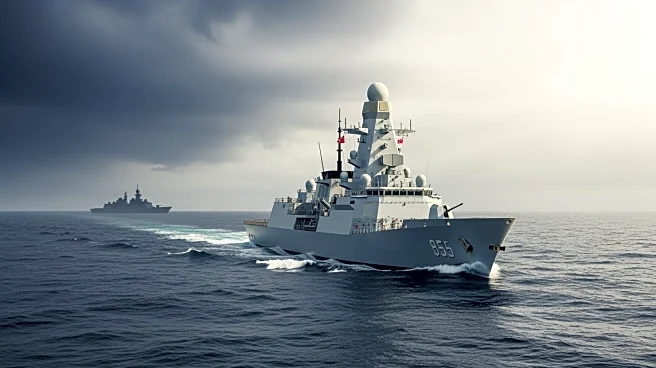What's Happening?
The UK Royal Navy has deployed the Type 45 destroyer HMS Duncan as part of a NATO operation to shadow the Russian destroyer Vice Admiral Kulakov in the North Sea. This operation, coordinated by NATO Allied
Maritime Command, also involved the Dutch Air Force and the French Navy. The Kulakov, a 6,200-ton displacement warship armed with missiles and anti-submarine warfare capabilities, was monitored as it moved westward through the English Channel towards the island of Ushant off the French coast. HMS Duncan, along with a Royal Navy helicopter, utilized its sensors and systems to intercept the Russian vessel. This deployment is part of a regular duty for the Royal Navy and NATO members to monitor Russian naval movements in northern European waters.
Why It's Important?
The deployment of HMS Duncan highlights NATO's ongoing efforts to maintain security and stability in European waters amidst increasing Russian naval activity. By shadowing the Vice Admiral Kulakov, NATO aims to deter potential threats and ensure the safety of critical maritime routes. This operation underscores the strategic importance of the English Channel and surrounding areas, which are vital for international shipping and military operations. The involvement of multiple NATO members, including the UK, France, and the Netherlands, demonstrates a unified approach to addressing security challenges posed by Russian military maneuvers. Such actions are crucial for maintaining the balance of power in the region and preventing escalation of tensions.
What's Next?
The Royal Navy, along with other NATO forces, is expected to continue its maritime security patrols in northern European waters. HMS Duncan and other vessels will likely remain vigilant in monitoring Russian naval activities, ensuring that any potential threats are swiftly addressed. The ongoing presence of NATO forces in the region serves as a deterrent to aggressive actions and reassures member states of their collective security commitments. Future operations may involve increased collaboration among NATO allies to enhance surveillance capabilities and response strategies. Additionally, diplomatic efforts may be pursued to address underlying tensions and promote stability in the region.
Beyond the Headlines
The regular monitoring of Russian naval movements by NATO forces raises questions about the long-term implications for international relations and military strategy. The presence of Russian warships in European waters could be seen as a demonstration of power, prompting NATO to reinforce its defense posture. This dynamic may lead to increased military spending and strategic realignments among NATO members. Furthermore, the situation highlights the importance of maritime security in global geopolitics, as control over sea lanes can significantly impact trade and military operations. The ongoing interactions between NATO and Russian forces may also influence diplomatic negotiations and efforts to reduce regional tensions.









